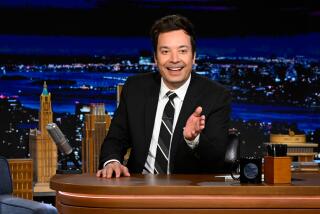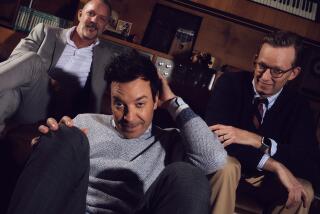It’s Letterman’s Turn to Laugh Late Into Night : Television: And the No. 1 reason why prognosticators were wrong: They underestimated Dave’s ability to attract a broad audience. But the NBC/Jay Leno camp says it’s still early.
- Share via
Three months ago, the television industry was preparing for a classic showdown as David Letterman and Chevy Chase prepared to move in on the late-night talk-show territory staked out by Jay Leno. As the clock ticked down, predictions flew from coast to coast about who would win the ratings shootout.
The consensus among advertisers, analysts and network executives was that, at least initially, Leno’s “Tonight Show” on NBC would retain its lead. Letterman, who had left NBC after failing to win the “Tonight Show” job from Leno, would finish second on CBS. And most believed that Chase would be a factor when he joined the fight on Fox.
When the dust settled, they were all wrong. Letterman, riding on the back of a huge publicity campaign, has overwhelmed his competition to establish himself as the new leader in late-night TV. Chase, a first-time talk-show host, stumbled badly and was canceled after only six weeks.
“I called it absolutely wrong,” said Betsy Frank, one of the industry’s top prognosticators. The senior vice president of Saatchi & Saatchi Advertising in New York had predicted that Letterman and Arsenio Hall would split the young, urban and hip, leaving the vast majority of the country to Leno.
“Clearly, I underestimated David Letterman’s appeal, to emerge from being a kind of cult, niche entertainer to one with a lot broader appeal,” she said. “At the same time, Chevy Chase didn’t offer a hell of a lot of competition, and the rest is history.”
*
Since the start of the official TV season in September, Letterman’s “Late Show” has averaged a 5.2 rating, translating into 4.8 million households. That’s a 79% increase over the one-hour crime dramas that CBS was programming in the time slot last year.
Leno, meanwhile, is averaging a 4.1 rating, down 7% from the same period a year ago. Chase, in his brief tenure, averaged a 2.6 rating. Arsenio Hall is getting a 2.2. Among other late-night fare, ABC’s “Nightline” is averaging a 4.9 and Conan O’Brien is drawing a 1.8. (Each point represents 942,000 homes.)
Bill Croasdale, president of national broadcasting for the Los Angeles ad agency Western International Media, who had predicted that Leno would remain No. 1, credits Letterman’s surprise showing to heavy promotion by CBS and to the media furor over the whole late-night arena.
“Letterman just came on like gangbusters, with good guest stars and sharp writing behind him,” Croasdale said. “Letterman has turned out to be a better host and interviewer than Leno. Leno’s forte seems to be strictly the stand-up comedy routines. Interviewing has always been a weakness of his--at least that’s how the industry perceives it.”
The media hoopla has brought more viewers to the late-night party. Viewership in the 11:35-12:35 period this season is up 7% over last year, or 2 million additional households. And all those homes seem to be tuning into Letterman. CBS research indicates that the bulk of his viewers are educated and affluent young adults, with an even split between men and women--a far cry from the college boys many theorized were Letterman’s primary audience when he aired at 12:35 a.m. on NBC.
Even CBS executives underestimated their man. “I was quoted as saying we would hope to be No. 1 after year two,” recalled Rod Perth, senior vice president of late-night and non-network programming for CBS. “There was a certain pent-up demand for Dave that we didn’t expect. He just struck a chord with viewers. The rhythm of the show, the energy of the show and his added warmth all added up to a broadened appeal. And he is clearly a man who is enjoying the ride.”
*
NBC is not willing to concede defeat, by any means. “We’re still in the fairly early stages,” said Eric Cardinal, vice president of program research for NBC. Since the end of the baseball playoffs on CBS, during which Letterman was promoted heavily, Leno has narrowed the ratings gap a bit, Cardinal said.
“We are happy with our performance, given what we knew would be major new competition in the day part,” Cardinal said. “We are basically holding our own compared to last year. So we’re still taking this wait-and-see approach.”
NBC is searching for new ways to promote Leno. Two weeks ago, “The Tonight Show” began taping in Burbank at 5 p.m., a half-hour earlier than before. NBC’s promotional department wants to get topical teases, featuring clips from each night’s show, out to stations to air in prime time and during the late news. That’s something Letterman does regularly because his show tapes earlier in New York.
There have been changes in Letterman’s camp as well, aside from the show’s flashy new Broadway home at the refurbished Ed Sullivan Theatre on 53rd Street. For the earlier time slot, Letterman has traded in his khaki pants, sports jackets and sneakers from his old NBC days for nicer suits.
And longtime executive producers Peter Lassally and Robert Morton have tried to liven up the studio audience, which they said was missing Letterman’s humor toward the end of the NBC run. There were too many stuffy VIPs in the house, they said, and visitors who wandered in from the NBC tour or nearby Rockefeller Center. At CBS, Morton and Lassally limit the number of VIP tickets and only hand out seats to fans who write in for them.
“These people wrote in for tickets, waited two or three months, and they’re all dressed up to go out,” Lassally said. “This is their trip to see a Broadway show.”
“As a result, you see a much happier, friendlier and warmer David Letterman,” Morton said. “Dave is showing his enthusiasm for the new show more than people are used to. He’s not struggling to get a laugh.”
Letterman’s greatest disadvantage going in was that roughly one-third of the CBS stations across the country were not airing his show at 11:35 p.m. Instead, they chose to air syndicated programming, for which they get to keep more of the advertising time to sell on their own. Letterman was delayed 30 or 60 minutes, when fewer people are watching television.
With his success has come an improved clearance rate, however--it’s now at 76%--and, as the remaining CBS stations fall into line in carrying “Late Show” at 11:35, the national ratings are likely to improve.
“The long-term belief was we had the stronger late-night franchise with David Letterman, but we expected to evolve slowly, considering the network’s late-night performance in the past, with low station clearances and low ratings,” said David Poltrack, senior vice president of planning and research for the CBS Broadcast Group. “The speed with which the show caught on and was accepted by the viewers was a pleasant surprise to us.”
A pleasant surprise but also a missed opportunity. Before the season began, CBS projected a 4.1 rating for “Late Show” and sold most of the season’s advertising based on that number--for an average of $30,000 to $35,000 per 30-second commercial. Still, the network stands to reap well over $100 million in revenue on Letterman’s first year, after his salary and agency commissions. And CBS did save some time to give advertisers in case Letterman’s ratings fell short of expectations; those spots are now fetching up to $45,000 each.
At Fox, meanwhile, affiliates are currently airing repeats of “Code 3” and “In Living Color” until the network can come up with a new host and a new show. Network executives won’t comment on where the process stands. “We’re really waiting until we can put our best foot forward this time,” a Fox staffer said.
More to Read
The complete guide to home viewing
Get Screen Gab for everything about the TV shows and streaming movies everyone’s talking about.
You may occasionally receive promotional content from the Los Angeles Times.






